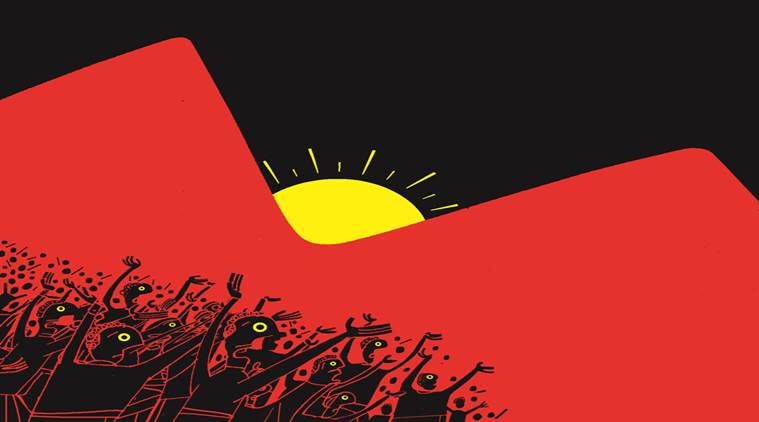A mirror of his time
Karunanidhi’s biography tells a rich story of the promise — and limitations — of Indian democracy and the pragmatics of social justice

Karunanidhi was part of a generation that came to political life to realise the promises of the modern world — of rights, democracy, education for all, economic and social welfare. (Illustration by C R Sasikumar)
For a substantial section of the Tamil people, M Karunanidhi has been more than a chief minister and political leader. His life in politics spoke to their experiences of caste-based discrimination, poverty and social injustice, and equally, to their aspirations to live in a world with their self-respect intact, and their material wants addressed. It was as if his persona mediated their claims and his charisma was a guarantee that these would eventually be honoured. Fundamentally, though, Karunanidhi has earned this place through untiring labour expended in organising, speaking, writing and governance.
He was part of a generation that came to political life to realise the promises of the modern world — of rights, democracy, education for all, economic and social welfare. Yet he was singular — the precocious child of a history of principled and angry opposition to brahminical hegemony, in education, culture and governance, and to birth-based privilege. He worked that history to careful political purpose, and built a party and government that vowed to legislate and govern for the underclasses and undercastes. The verdict is still out on how successful he and his party were in their intent. Yet this much is commonsense: In post-Independence India, the DMK more or less set the terms of political debate and mobilisation in Tamil Nadu.
Whether it has to do with reservation for the backward classes and Dalits, the autonomy of states and the need to achieve genuine federalism within the Indian Union, the language question and the necessity of building a secular polity, Karunanidhi and his party proposed an alternative to both the Congress and left parties. By favouring the claims of social justice and welfarism over radical economic reforms, by playing an adroit politics of linguistic and cultural self-determination, rather than militant nationalism, and by refusing a politics steeped in religious prejudice in the name of a bold agnosticism and secular comradeship, Karunanidhi’s DMK set the tone for political action in the state.
The gains of this approach are worth listing: The successful working of the reservation policy has been entirely due to how Karunanidhi had his ear to the ground and followed keenly caste battles and assertions, as well as Dalit protests. In 1971, he increased the percentage of reservations awarded to the backward classes and Dalits, in response to the findings of a government-appointed commission. Following the Vanniyar agitations of the 1970s, a substantial percentage was marked for a new category comprising most backward castes and denotified communities, within the backward classes’ quota. In the backdrop of the Sachar Committee report, quotas for Muslims (and Christians) were put in place in 2007, again, within the backward classes category.
Social justice, oriented to the future, was supplemented with welfarist projects, anchored in the present. An expanded public distribution system, subsidised and free electricity to farmers, a revamped noon day meal scheme, support for indigent brides and pregnant mothers… During his 1971-76 tenure as chief minister, Karunanidhi set in motion a welfarism that he elaborated in subsequent terms in office. On the other hand, he did envision economic growth and a role for the state in achieving this and set about instituting a slew of measures: Nationalisation of transport, setting up of the state’s slum clearance board, new universities, industrial hubs.
These measures notwithstanding, social injustice remains, and Dalits bear the brunt of it. Further, dominant backward castes have benefited considerably, both on account of reservation, and also by working economic changes to their advantage and sections amongst these castes have turned vehemently casteist. The DMK has struggled with these developments. Part of the problem has been the gradual transformation of the party worker: From people’s representative to a political fixer who helps win elections, and meanwhile social justice, and indeed the whole project of subaltern rule, stands compromised.
Karunanidhi was not unaware of these developments, and had to balance the returns on electoral democracy with purported and real ideological intent. This was most evident in his party’s stance on federalism and state autonomy. Given that parties at the Centre are anxious to find their toehold in regional contexts, federal claims are easily scuttled by the logic of electoral alliances with this or that regional party. The DMK under Karunanidhi did not shy away from this logic, and meanwhile attempted to uphold the interests of the state through a variety of means: A politics of protest directed at the Centre’s policies to do with education and economic growth; a critique of financial allocations; seeking berths in the central cabinet to advance the interests of the state, and finally the upholding of the normative claims of federalism as a form of rule.
But there is so much that might be achieved within a grossly imperfect federal polity: And sometimes the price paid is high, as happened when Karunanidhi went against the grain of his party’s history and teamed up with the BJP in 1999 and remained with it through Gujarat 2002. Clearly, without the terms of the Indian Union being reimagined, such opportunism will continue to attract even the most ideological-minded of men (and women, as we saw with Mayawati’s support for the BJP in 2002).
Yet Karunanidhi was a secularist and avowed rationalist. In particular, he rendered legitimate a public critique of religion and refused to elevate religious prejudice to a reasonable argument. He also, time and again, made clear that God cannot have a place in a democratic republic — to this day, a majority of DMK legislators take their oath of office in the name of the Constitution of India, and not their God or conscience. On the other hand, the party has engaged with faith-based institutions productively: As early as 1971, the DMK under Karunanidhi petitioned the Supreme Court to open the office of archakas or temple priests officiating in agamic Hindu temples to all, irrespective of birth, and subsequently set up an institution for training such priests. The DMK has also consciously included non-Hindu citizens and legislators in its Dravidian fraternity.
A state-builder, ideologue, writer, a critic of birth-based privilege, brahminical hegemony and the varna order, and a keen political realist, Karunanidhi’s political record is riven with contradictions, some productive, others unsettling. But his biography tells a rich story of the promise — and limitations — of Indian democracy and the pragmatics of social justice.
Geetha is a Chennai-based social historian and author of Undoing Impunity: Speech after sexual violence
For all the latest Opinion News, download Indian Express App
More From V Geetha
- Tamil Nadu’s season of discontentFarmers’ deaths have been reported from the drought-hit Cauvery delta. Loan waivers, soft loans and compensation for ‘proven’ suicides are insufficient as state response...
- Victory for populismTamil Nadu has a new government. But will it have new governance?..
- The silencing of MuruganHow the Hindu far right conspired with caste-based assertion to break his spirit...








































No hay comentarios:
Publicar un comentario